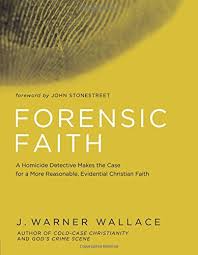Why am I a Christian and not a Muslim, Hindu, Buddhist or Atheist? If I answer “because that is what I grew up with,” or “because I had an experience,” or “because I just feel that it is true” then I have an accidental faith. The problem with an accidental faith is that it is based on me and my feelings, it cannot hold up to questions that require evidence, and in fact people from every other belief system can give one of those same answers. In today’s culture, especially in public education, proving your position (whether religious or not) is more important than ever, and if you are not able to do so your view is quickly disregarded and even worse deemed false.
This is exactly why Christians need to become equipped to answer questions about their faith. The problem though, is that many Christians do not think they need to defend their faith. However, if they looked closely at their own family, friends or acquaintances I would wager that they know someone who has walked away from Christianity, or never really considered it, because something has made them think it is not evidentially true.
I will be teaching from J. Warner Wallace’s book Forensic Faith over the next few posts to help us understand why it is critical to equip Christians to answer tough questions, and more importantly to correct misconceptions and wrong thinking concerning the Christian faith and the Bible. It is not only critical to equip Christians to defend their faith, but it is becoming even more necessary to teach why it is critical in today’s culture and educational climate. Wallace does an outstanding job of that and I want to share some of his insights in my apologetics’ curriculum.
Janet Mefferd, nationally syndicated Christian radio personality and host of Janet Mefferd Today said this about Forensic Faith:
“Today, too many evangelical Christians would rather ‘feel’ their faith than actually understand and defend it. With biblical precision, solid evidence and masterful reasoning, Jim Wallace challenges believers to both embrace and make a thoughtful and intellectually robust case for historic Christianity. “Forensic Faith” is exactly what the church needs today!”
“Christians would rather ‘feel’ their faith than actually understand and defend it.” But what about the times when feelings waver and doubts raised by others about the faith weigh on you? This is exactly what kept me from becoming a Christian for so many years as I questioned the rationale of believing, and Christians I knew could not give evidential answers. I eventually found people who could and thankfully I became a Christian, not because it was something I felt was true (although that can be part of it) but because I discovered it was evidentially true!
Statistics are showing that upwards of 70% of young Christians between the ages of 15-30 will leave their Christian faith. Why is this happening? Listen to J. Warner Wallace address this questions on the “One Minute Apologist:”
Here are the three points Wallace made:
- Young Christians are underprepared to make a case for what they believe
- Young Christians come up against a hostile culture and university environment where the majority in academia are untrusting of Christianity
- Young Christians have to deal with a basic fallen nature and human desires that are at their peak during these years anyway
If we take care of the first point then they may have a better chance against the other two. However, according to Wallace, before you can equip Christians to make a case for Christianity, you have to make a case for making the case! This is where Forensic Faith can help.
Groups that keep a pulse on religious opinions through national and international surveys (Barna, Pew, Gallup, Southern Baptist, etc.) are all showing the decline of Christianity in Western culture and trends that lead in that direction. Wallace reports on some of the alarming statistics among young people who claim to be Christians:
- 63% don’t believe Jesus is the Son of God
- 51% don’t believe Jesus rose from the dead
- 68% don’t believe the Holy Spirit is a real being
- Only 33% say church will play a part in their lives when they leave home
Young people are also up against these statistics at the university level:
- College professors are nearly five times more likely to be professing atheists or agnostics than people in the general population.
- The vast majority of university professors reject the Bible as “the actual word of God.”
The largest segment of young, ex-Christians surveyed said they left Christianity because they had intellectual doubt, skepticism, and unanswered questions. If these trends continue, church attendance will decline by 50% in the next decade.
If you are a Christian in the position to give answers to someone who is doubting or skeptical of the faith (and we all should be in that position) then we need to take on the motto that Wallace gives us in his book Forensic Faith. This motto is based on two things: Wallace’s former career as a Police Officer, and the Biblical call for all Christians to defend their faith. As Christians, like those in the Los Angeles Police Department, we are to “Serve and Protect.” Serve those in need, and protect the truth of faith by giving answers to all who ask about the hope we have in Christ Jesus (1 Peter 3:15).
Why are you a Christian? I hope part of your answer will include, “Because it is evidentially true!” Stay with us over the next few posts as we continue to examine how to have a “Forensic Faith!”
—————————————————————————————————————————————————————-
You will not find this material in the public school curriculum even though it is based on solid evidence and grounded in research. It is ironic that following the evidence to where it leads stops at the door of our public schools as they will not let a “Divine footprint” in! Join us as we examine evidence for Christianity and learn how to become a thoughtful defender and ambassador of your faith.
Click into the resource page of this website to view many of the top Christian thinkers and apologists along with some of their work; connecting to these types of resources is essential in your Christian growth.
Please let me know what you think: Give feedback, ask questions or send concerns in the comment section of the blog.
Teri Dugan



Sorry, comments are closed for this post.